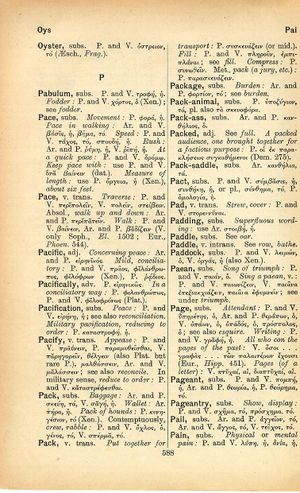pain
οἵ γε καὶ ἐν τῷ παρόντι ἀντιπάλως μᾶλλον ἢ ὑποδεεστέρως τῷ ναυτικῷ ἀνθώρμουν → whose navy, even as it was, faced the Athenian more as an equal than as an inferior
English > Greek (Woodhouse)
substantive
physical or mental pain: P. and V. λύπη, ἡ, ἀνία, ἡ, ἀλγηδών, ἡ, ἄλγημα, τό (Dem. 1260), ὀδύνη, ἡ, Ar. and V. ἄλγος, τό, ἄχος, τό.
mental pain: P. ταλαιπωρία, ἡ, V. δύη, ἡ, πῆμα, τό, πημονή, ἡ, πένθος, τό, οἰζύς, ἡ.
have a pain in one's finger: P. τὸν δάκτυλον ἀλγεῖν (Plato, Republic 462D).
in pain, suffering pain: use adj., P. περιώδυνος.
pains, trouble: P. and V. σπουδή, ἡ, Ar. and P. μελέτη, ἡ.
take pains: P. and V. σπουδὴν ποιεῖσθαι, V. σπουδὴν τίθεσθαι, Ar. and P. μελετᾶν.
pains and penalties: use P. and V. ζημία, ἡ.
free from pain, adj.: P. and V. ἄλυπος, V. ἀνώδυνος, ἀπενθής, ἀπένθητος; see painless.
verb transitive
pain (physically or mentally): P. and V. λυπεῖν, ἀνιᾶν, V. ἀλγύνειν.
distress, grieve: also P. and V. δάκνειν, Ar. and P. ἀποκναίειν, Ar. and V. κνίζειν, πημαίνειν (also Plato but rare P.), τείρειν, V. γυμνάζειν.
be pained: use also P. and V. ἀλγέω, ἀλγεῖν, ὀδυνάω, ὀδυνᾶσθαι.

